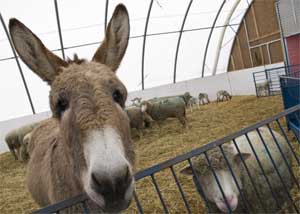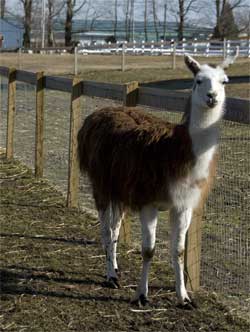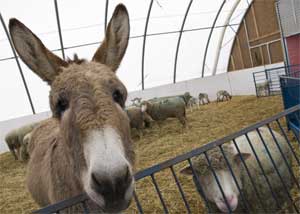 KINGSTON, R.I.–March 17, 2009–Bonnie has the calmness of a yoga instructor, the instincts of a shepherd, and the ability to kick a coyote to kingdom come. These attributes make the University of Rhode Island’s guard donkey more than worth her weight in hay.
KINGSTON, R.I.–March 17, 2009–Bonnie has the calmness of a yoga instructor, the instincts of a shepherd, and the ability to kick a coyote to kingdom come. These attributes make the University of Rhode Island’s guard donkey more than worth her weight in hay.
The 14-year old jenny (female donkey) is especially busy this month keeping watch over 34 sheep and 45 newborn lambs. URI uses its Peckham Farm and its animals for hands-on learning for its 200 or so students who major in animal science. Most graduates go on to veterinary school, graduate school, or become teachers, farm managers, or veterinary or lab technicians.
But let’s start at the beginning. Protecting URI’s flock became a priority during the fall of 2003 when dogs discovered a way to bypass an old electric fence and entered the pasture. The dogs killed one of the sheep and seriously harmed six others, including one that later had to be euthanized. All 19 sheep in the pasture, except one, had multiple puncture wounds.
Katherine Petersson of Douglas, Mass., an assistant professor in URI’s Fisheries, Animal, and Veterinary Science Department, found Bonnie while browsing the Internet in search of a way to protect the sheep. She discovered that The Rosefield, a farm located just outside Pittsburgh, Pa., trains and sells guardian donkeys. URI bought Bonnie for $750.
Although all donkeys have a herding instinct and a natural aversion to canines, not all of them make good guardians. The sheep and the donkey must accept each other as “flock mates.” Bonnie, although subdued, seems like a tall sheep with big ears.
That brings us to Dee, URI’s other guard donkey who arrived in 2006. A friendly and curious jenny, she just doesn’t fulfill her job description. “Dee likes food more than she likes sheep,” explains Petersson “and if both are in the same place at the same time, the sheep lose. Needless to say Dee is not allowed anywhere near the sheep,” says the professor noting that the donkey is well named. “I’d give her a D.”
 Then there’s Stukey the llama. Although he gets along well with the sheep, you can’t say that about his relationship with his handlers. “He needs to be socialized,” says Petersson. For now, he’s pastured with the affable goats and the Highlander calf.
Then there’s Stukey the llama. Although he gets along well with the sheep, you can’t say that about his relationship with his handlers. “He needs to be socialized,” says Petersson. For now, he’s pastured with the affable goats and the Highlander calf.
Bonnie was pregnant when she arrived at URI and within eight months delivered Clyde, a feisty foal who liked chasing the sheep and biting his tolerant mother’s legs. Torn by her loyalty to her training and her offspring, Bonnie became confused. Clyde had to pack his bags when he was four-months old. After a shaky start, Clyde happily guards goats and turkeys at a nearby farm.
When any coyote walks the Peckham Farm fence line, Bonnie has been known to start braying loudly and stomping her feet. The coyotes immediately high tail it. While coyotes are opportunistic and love mutton, they also know enough not to get near an irate donkey.
Domestic dogs, however, don’t get detoured quickly. If one gets near the sheep, Bonnie would confront it and chase it away. If the dog didn’t retreat, Bonnie has many weapons at her disposal. She can bite it with her powerful jaws, raise her hind legs and strike it with both front feet or swing around and land blows with her back feet. Since she’s taken up residence at URI, the flock has been safe from harm. “She’s round-the-clock protection,” says Petersson, noting when the farm is quiet at night, Bonnie is busy counting sheep.
Bonnie is the boss of the barnyard. She keeps her flock in line pinning back her ears and shaking her head. The offending sheep know to move or else. If a sheep strays in the pasture, Bonnie will herd it back to the flock. Once two ewes began fighting over a newborn lamb. Bonnie stepped in – standing directly over the lamb and would not let either ewe near it until the farm staff figured out which ewe was the lamb’s mother.
If the sheep give Bonnie any lip, she will reinforce with a quick nip. “She’s like a bossy sibling — with teeth,” the URI professor says.
Photos by Nora Lewis

